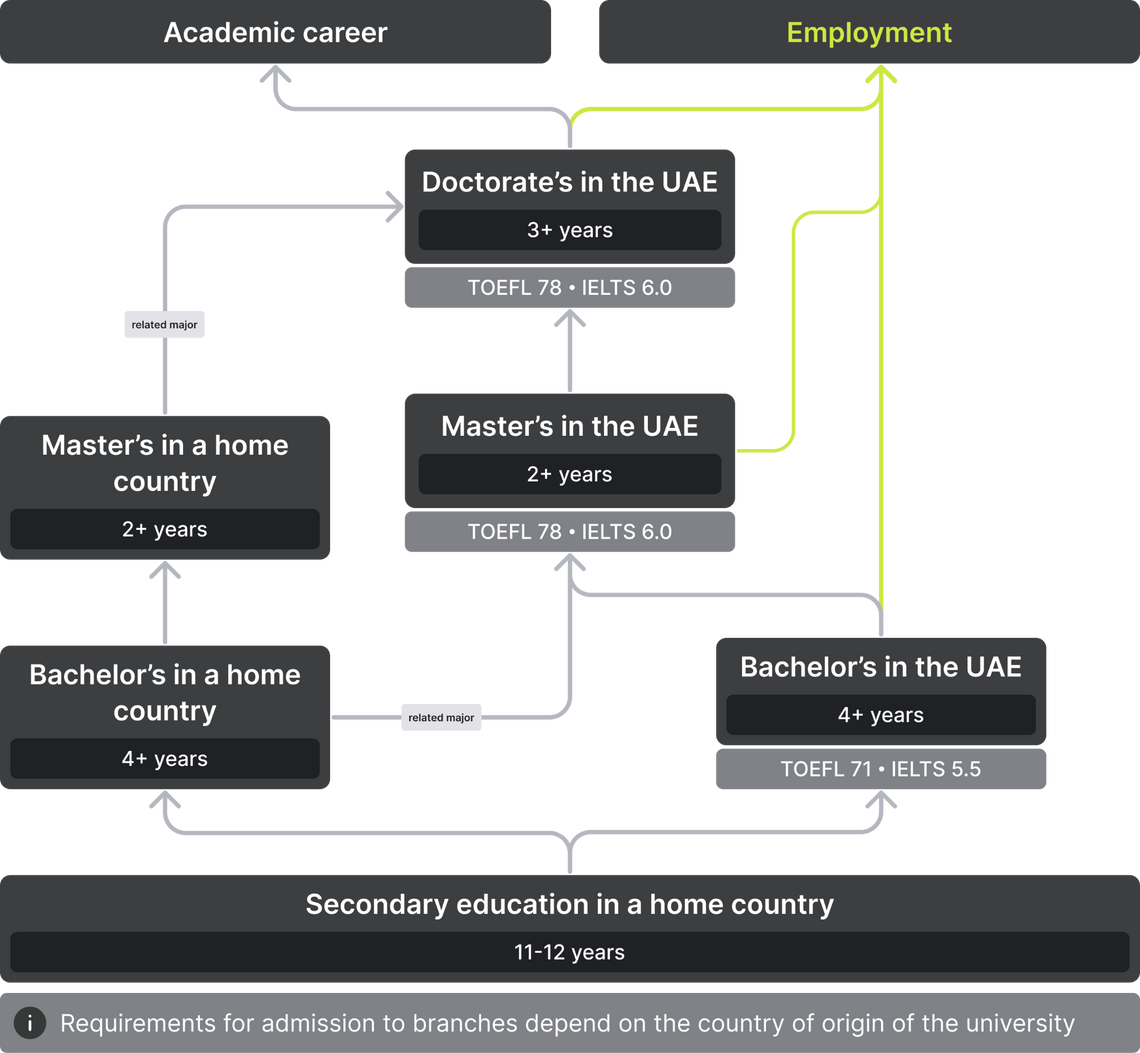Apply to a foreign university with confidence
- Properly fulfilled documents
- Perfect motivation letter
- Support from a personal mentor
- Offers from several universities
The main language of higher education in the UAE is English, and you can enter immediately after grade 11. Read about all the intricacies of studying in the Emirates in our article: how much it costs, what documents are needed and what to do after graduation.
Free consultation




Secondary education in the UAE lasts for 12 years. Private schools in the UAE are very popular with foreigners and locals due to the fact that studies are conducted in English and international diplomas are issued upon graduation. You can choose an institution with American, British, French, Indian and Russian programs. Before enrolling in a local university, graduates of private schools must confirm the equivalence of their diploma with the UAE Ministry of Education.
In public schools, instruction is entirely in Arabic, boys and girls study separately, and the study of Islamic culture is mandatory. Foreigners can study here for a fee. English is studied as a second language from grade 1. Children are accepted from 6 years (Elementary Education). From the 6th grade, Lower-secondary education begins. This stage lasts for 4 years. Then students can choose their path through grades 10-12 (Upper-Secondary Education):
Education in the UAE began its history less than 50 years ago and therefore managed to absorb only the most modern and effective practices. The experience of the world leaders in the field of education is being implemented here: the USA, Great Britain, Canada, and Australia. 15-20% of the state budget is annually spent on the education sector[1]. Foreigners from all over the world make up the majority of both the student and the teaching body. Little is known about studying in this exotic country, so there is still a chance to get a good discount on training for foreign students.
Items 1-6 of 95
Advanced search
| Type of education | Age | Duration | Min. cost | Avg. cost | Language requirements |
|---|---|---|---|---|---|
| Summer camp | 6+ | 1-4 weeks | 354 USD/week | 545 USD/week | A1 — Elementary |
| Language courses | 14+ | 1-12 weeks | 136 USD/week | 272 USD/week | A1 — Elementary |
| Secondary education | 6+ | 12 years | 3,268 USD/year | 8,170 USD/year | B1 — Intermediate |
| Foundation | 17+ | 1-2 semesters | 8,170 USD/year | 10,893 USD/year | IELTS 5.5 |
| Bachelor's | 18+ | 4 years | 10,349 USD/year | 14,978 USD/year | IELTS 5.5 |
| Master's | 20+ | 2 years | 13,072 USD/year | 23,148 USD/year | IELTS 6.0 |
| MBA | 20+ | 2 years | 21,242 USD/year | 40,850 USD/year | IELTS 6.5 |
| Doctoral | 20+ | 3 years | 35,403 USD/year | 54,466 USD/year | IELTS 6.5 |
| Item | Average cost |
| Language exam (IELTS) | 271 USD |
| Student visa | 1,906 USD |
| Flight | Depending on the place of departure |
| Rent | 1,634 USD/semester |
| Transportation | 68 USD/month |
| Meals | 109 USD/month |


The application process to UAE universities is fully automated. The applicant fills out a questionnaire on the website of the selected university, attaching scans of education documents, IELTS or TOEFL results and an ID. Depending on academic performance, a student can be admitted right away (direct admission) or placed on a waiting list (conditional admission). It is better to have a GPA of at least 3 out of 4. Excellent students can also count on a significant discount.
You do not need to know Arabic to study in the Emirates: the main language of higher education in the country is English. At the same time, the language requirements are low and start at IELTS 5.5. Sometimes universities conduct entrance examinations in English. If you still want to study in Arabic, you will have to pass the local exam EmSAT for high school graduates. However, Arabic-speaking universities rarely accept foreigners, and training can be separate for men and women.
Some institutions also ask candidates to undergo a medical examination and send them a Medical examination form. Applications are accepted 2 times a year: in April-May and October-November. Please note that most UAE universities do not recognize distance learning diplomas and external studies, even if the school or university that issued the document is officially accredited in your country.
Additionally for master's and doctoral studies:
All documents and their copies must have a certified translation into English and/or Arabic. Translation requirements should be clarified at a specific university.

If you plan to study or work in the UAE, all documents on education issued abroad may bу first required to go through the consular legalization procedure. This process can take up to 3 months, as it includes several stages:
Final approval from the embassy can only be obtained if all stages of the procedure have been completed. Please note that the transcript with grades must also be legalized.
Some universities or employers may require additional confirmation of document equivalence with the UAE Ministry of Education. This can be done quickly and easily online on the department website. Price — 14-54 USD per document, depending on the level of education.
Some universities offer school graduates to complete one-year preparatory Foundation programs. They are not mandatory and quite expensive. Nevertheless, classes in such courses help to improve English proficiency, master core university disciplines at a basic level and generally adapt to student life. Foundation is also popular with local applicants, as there is little emphasis on English in public schools. Credits earned during the Foundation, can be transferred to the bachelor’s program, and the best students can sometimes even enter the 1st year of the university without exams.
At the moment, UAE universities are considering the abolition of such programs. Most likely, this will happen by the end of 2021, but there is no official confirmation at the time of 2020. The reason is the very high cost of the Foundation for the state and the universities themselves. In addition, local schools have revised their curricula and increased the number of English lessons, so high school students in the UAE are now more prepared for entering the university.

College education is not the most popular choice among foreigners in the United Arab Emirates. Such institutions should not be confused with colleges within the university, which are similar to faculties or departments that combine several specialties of one area.
Officially, foreign applicants can only enter private colleges, which are the majority in the country. Government agencies make exceptions on rare occasions, mainly accepting only UAE citizens or resident graduates of local schools after passing the EmSAT exam. The main mission of colleges is to provide specialized education to those who cannot enter the university and to provide the labor market with professional staff.
In most colleges, you can get an applied specialty in business, IT, construction, and some other fields with the assignment of one of the following qualifications: Certificate, Diploma, Associate Degree, or Higher Diploma, depending on the duration of study (1-3 years). After graduation, students can immediately start working or continue their studies at a bachelor's cycle at a university. There are also colleges with higher education programs: bachelor's, master's, and MBA.
Universities in the United Arab Emirates operate according to the three-stage Bologna system. The first stage is bachelor's, which usually lasts for 4 years. Engineering and Architecture Programs — 5 years. During this time, the student earns 120-140 credits on average, depending on the specialty. The curriculum consists of general education subjects, specialized disciplines, and electives in their field. Some programs include a compulsory internship. Graduates receive a Bachelor of Arts or Bachelor of Science degree. Each university sets the requirements for admission independently, but traditionally, for admission to a bachelor's program good secondary education and language certificates are enough.
All documents and their copies must have a certified translation into English and/or Arabic. Translation requirements should be clarified at a specific university.

Master's programs are often research-oriented. Studying at the university at this stage lasts for 1-2 years and the student can earn from 30 to 60 credits. In most cases, in addition to general courses in a specialty, a master's degree includes writing a diploma or working on one's own research project. However, there are also cheaper programs where you only need to attend classes and pass final exams. Also, some universities offer one-year postgraduate courses focused on practice and employment. After graduation, students receive a postgraduate or graduate diploma in their chosen specialty. Earned credits can be transferred when enrolling in a full-fledged master's program.
To enter the master's program the bachelor's degree from an accredited university is needed. An average score should be at least 3.0 out of 4. Among other things, a language certificate should also be submitted.
All documents and their copies must have a certified translation into English and/or Arabic. Translation requirements should be clarified at a specific university.
To obtain a doctoral degree in the UAE, you must complete an academic PhD program. Training at this stage usually takes students from 3 to 5 years. As in the USA, PhD programs involve about 2 years of attending specialized courses, and then a year of writing a dissertation and oral defense in front of a commission. Also, UAE universities have professional doctoral studies: for example, Doctor of Business Administration. As a rule, specialists with 3-5 years of work experience are accepted to such programs to improve their qualifications and the level of expertise in their field. To enroll in a PhD, you will need a master’s degree with an average score of at least 3.3 out of 4.
All documents and their copies must have a certified translation into English and/or Arabic. Translation requirements should be clarified at a specific university.
The United Arab Emirates borrowed a system of academic qualifications from the United States. In local universities, the following positions are most common:

In the United Arab Emirates, higher education is paid for all students and is relatively expensive. Most universities try to support students by providing various scholarships and tuition discounts. Sometimes just because you are a foreigner. Payments can cover up to 100% of the cost of training, but more often they cover only 30-50%. Applications for scholarships are usually accepted at the same time as the admission ones. The main criteria are an excellent certificate and high IELTS results. The better the indicators, the greater the chance to get a discount. If a student has received a scholarship, at the end of each academic year, the administration will evaluate his academic and extracurricular success in order to decide whether to continue funding. Thus, a scholarship can sometimes be obtained while studying, by impressing the commission with your academic achievements over the past semester.
Also, active members of the university's sports teams and early bidders can count on discounts. Another feature of UAE universities is the so-called "family grants": if several brothers / sisters or other close relatives study at the same university at the same time, a discount is given to each family member.
To study at the UAE university you need a national student visa. After enrollment, the student fills out a visa application form on the website of the chosen university, attaching all the necessary documents. In this case, the educational institution acts as a sponsor, so you won't be able to apply for a visa yourself. A visa fee of about 1,906 USD is paid along with a deposit of about 681 USD, which is returned at the end of the course. This amount includes health insurance.
A student visa is valid for 1 year, then it must be extended without paying a fee. The UAE is discussing the possibility of issuing 5-year visas to gifted students, but the initiative has not yet been officially adopted. You will also need to obtain a temporary Emirates ID upon arrival. You can order the document online on the Federal Authority for Identity and Citizenship (FAIC) website. The applicant will receive an SMS when the ID is ready. Then the document can be obtained at the place of residence.

Until recently, international students in the UAE were not allowed to work while studying. The exceptions were employment on campus or an official internship from a university. Since 2017, concessions have been introduced in this area. Foreign adult students can now also work part-time (6 hours a day with lunch breaks) in non-governmental organizations. Students must first obtain an Emirates ID and Work Permit. The fee for receiving the latter is 136 USD.
However, internships and part-time jobs in partner organizations of the university remain the most reliable and promising option. This is a great opportunity to strengthen your resume and stay in the country after graduation. The UAE is a rapidly developing advanced country, with offices of world brands and thousands of businesses that need young qualified personnel and for this they directly cooperate with universities. Many students find good positions at job fairs. The city of Dubai also has the Creative City Network, a free economic zone that houses a variety of innovative technology centers. It is one of the most popular places to work among international students.
Most immigrants come to the United Arab Emirates to find a good job. Students are no exception. University graduates can obtain a job-seeking visa, which is valid for 6 months. There is a constant discussion in the government about increasing this period to 2-5 years for outstanding students, so it is worth keeping an eye on the situation. In any case, after getting a job offer, a person receives a permanent work visa, which is limited only by a work contract. In this case, the sponsor is the employer which means that the company that hired you manages the paperwork and all expenses itself. You will also need to undergo a medical examination to obtain a health card. It is recommended that you look for suitable vacancies already during your studies, since the summer after graduation is not the best time for this.
Obtaining UAE citizenship is difficult, and it is not needed for an expat to live comfortably in the country. However, a passport opens up many privileges: for example, free medicine and education. The applicant must legally stay in the country for at least 30 years. All this time it is preferable to work for a citizen of the Emirates, not break the law and learn Arabic. Women can apply for citizenship after 3 years of marriage with an Emirati. Also, the ruler of each emirate has the right to present citizenship to a foreigner for an outstanding contribution to the economy and development of the country. In all cases, the new resident is obliged to give up the second passport.

60+ countries
we work with
$1,000,000 saved
by students through scholarships
6,400 offers
our students got